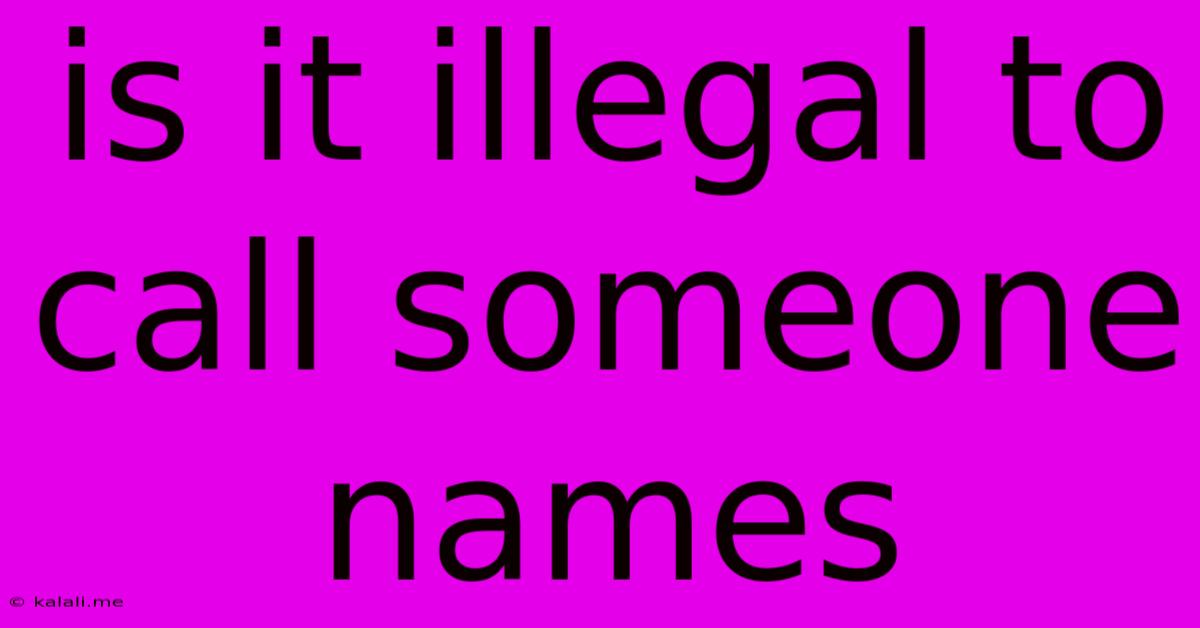Is It Illegal To Call Someone Names
Kalali
Jun 10, 2025 · 3 min read

Table of Contents
Is it Illegal to Call Someone Names? A Look at Harassment and Defamation
Calling someone names might seem like a trivial act, but the legality hinges on several factors. While simply calling someone a mean name isn't usually a crime in itself, it can become illegal when it crosses the line into harassment, defamation, or other offenses. This article will explore the nuances of this question, examining the legal implications of name-calling in various contexts.
What Constitutes Illegal Name-Calling?
The key lies in the context and the impact of the name-calling. A single, isolated incident of calling someone a name, even if offensive, is unlikely to lead to legal repercussions. However, repeated name-calling, especially if it's part of a larger pattern of harassment or intimidation, can have serious consequences. This is especially true if the name-calling:
- Is part of a campaign of harassment: Persistent name-calling, particularly if combined with other forms of harassment like stalking, threats, or unwanted contact, can be considered a crime under harassment laws. These laws vary by jurisdiction but generally aim to protect individuals from unwanted and intimidating behavior.
- Is defamatory: If the name-calling falsely accuses someone of something that damages their reputation, it could be considered defamation (libel if written, slander if spoken). This requires proving the statement was false, published to a third party, caused damage to the person's reputation, and was made with malice (knowledge of falsity or reckless disregard for the truth). Simply calling someone a "thief" without evidence would be an example.
- Is discriminatory: Name-calling based on protected characteristics like race, religion, gender, sexual orientation, or disability can constitute hate speech and discrimination, potentially leading to civil lawsuits or even criminal charges depending on the severity and context.
- Creates a hostile work environment: In the workplace, consistent name-calling can contribute to a hostile work environment, violating workplace discrimination laws. This is particularly true if the name-calling is targeted based on protected characteristics.
- Involves threats or incitement to violence: Calling someone names coupled with threats of violence or incitement to violence against them can be a serious crime.
Legal Protections and Recourse
Individuals facing illegal name-calling have several avenues for recourse:
- Cease and desist letters: A formal letter demanding the cessation of the offensive behavior can be effective, especially if the name-calling is causing distress but doesn't yet reach the level of a crime.
- Civil lawsuits: If the name-calling constitutes defamation or harassment, a civil lawsuit can be filed seeking compensation for damages.
- Criminal charges: In cases involving severe harassment, hate speech, or threats, criminal charges can be filed, leading to fines or imprisonment.
- Reporting to relevant authorities: Depending on the context (e.g., workplace, school), reporting the incident to the appropriate authorities (HR, school administration, police) is crucial.
The Importance of Context and Intent
It's crucial to remember that the legality of name-calling depends heavily on context. A playful nickname amongst friends is vastly different from a targeted campaign of abuse. Intent also plays a role, though proving intent can be challenging. The impact on the victim is equally important; even if unintentional, severe emotional distress caused by name-calling can have legal implications.
Conclusion
While simply calling someone a name isn't typically illegal, repeated, malicious, or discriminatory name-calling can lead to serious legal consequences. Understanding the nuances of harassment, defamation, and discrimination laws is crucial in determining whether name-calling constitutes an illegal act. If you're experiencing persistent name-calling that causes distress or harm, seek legal advice and consider reporting the incident to the appropriate authorities.
Latest Posts
Latest Posts
-
Rrb Ntpc Previous Year Question Paper
Jun 12, 2025
-
Whats The Difference Between Prism And Pyramid
Jun 12, 2025
-
Where Are Passwords Stored In Linux
Jun 12, 2025
-
Which Of The Following Is Natural Polymer
Jun 12, 2025
-
Which Of The Following Is An Inorganic Compound
Jun 12, 2025
Related Post
Thank you for visiting our website which covers about Is It Illegal To Call Someone Names . We hope the information provided has been useful to you. Feel free to contact us if you have any questions or need further assistance. See you next time and don't miss to bookmark.